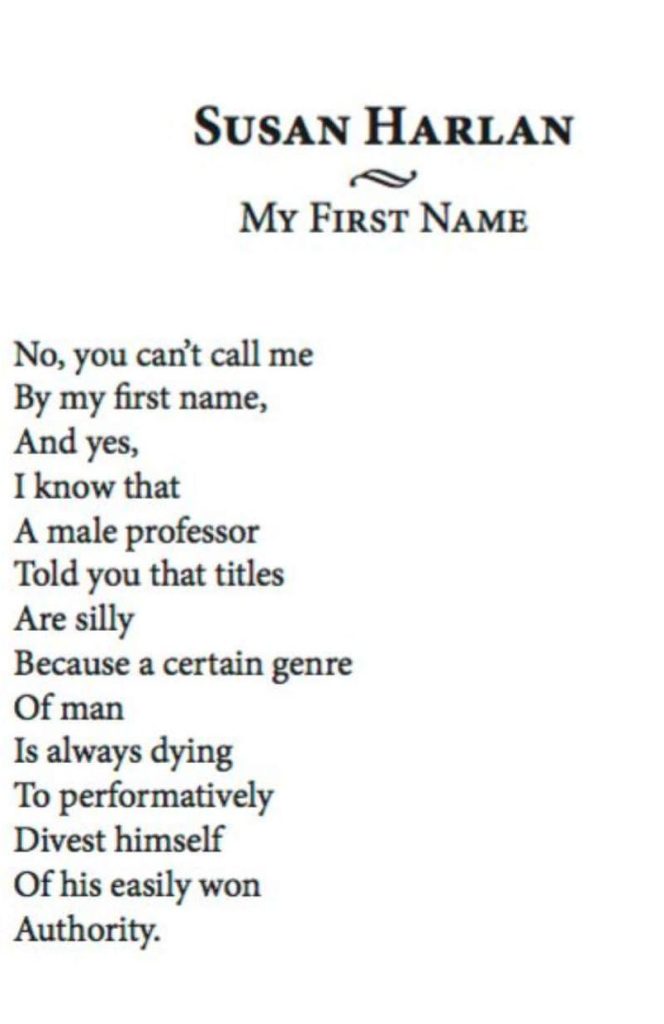I have some version of this conversation with a lot of my first year students, so I thought it was worth finally putting something more official together, in terms of how titles work in academia. There’s no reason that anyone who is new to college would necessarily know any of this stuff (no one is born understanding the implications of different academic titles) and the stakes can be somewhat high for screwing things up, so a quick explainer might be in order!
A few caveats: titles are different outside the US, and this is only meant for US use! Also, there are a range of instructors in colleges, not all of whom are professors and not all of whom have PhDs, but these are nonetheless fairly generally applicable guidelines.
Why does this matter? It’s not a big deal what title someone uses, is it?

When one discusses academic titles, one is contractually obligated to include this poem by Susan Harlan. I don’t make the rules. But also, it’s a great road into talking about why any of this matters.
Authority in the classroom is a tricky thing. People who look like society expects a professor to look have a much easier time gaining or maintaining the respect of students, because they easily accept that person as an authority. The less someone matches that imagined professor ideal, the more students tend to question their authority. Female professors are (in broad, general terms) far more likely to have their expertise questioned than their male counterparts. Anecdotally, I rarely hear from male colleagues that a student challenged their knowledge of a topic in class. It happens much more frequently for women, especially women in a field or a specialty that is traditionally male-dominated (military history, for example).
Gender is far from the only axis this happens along. Women of Color are significantly more likely to face this kind of push-back from students than white women are and we see similar phenomena across all different aspects of identity. So if you happen to be someone who steps into the classroom already equipped with a full helping of authority just by virtue of who you are and how you look, you may have some authority to burn. That’s a privilege certain people have, and it isn’t afforded to everyone equally.
If you have all this excess authority oozing out your ears, you can wear ratty jeans and flip-flops and have your students call you by your first name. There’s no risk that students will forget that you’re an authority figure. There’s no risk that your performance evaluations will reflect a perceived lack of qualification or expertise — after all, you look the part. But that’s not something everyone can do, so titles can matter a lot for people who look less like a professor is expected to look.
Guideline #1: Call people what they want to be called
This is a really good rule in all aspects of life. If someone asks you to call them Doctor or Professor, it’s a good idea to do that. If someone tells you the name they’d like to use, use it! If you’re a student, you can always ask someone if you aren’t sure how they would like to be addressed. If you’re an instructor, it’s a great idea to include a little blurb in your syllabus or a comment on the first day of class about how you would like to be addressed. A more subtle clue you might notice as a student is how your professor signs their emails or introduces themselves.
Guideline #2: If an instructor has a PhD, they are a doctor.
Whether someone prefers to be called Doctor or Professor is generally sort of a personal preference and there isn’t usually a difference. Technically, ‘Professor’ is a job title and ‘Doctor’ is signifying a degree someone holds, so there are a lot of doctors out there who aren’t working as professors. Most professors are doctors (there are some exceptions, especially in the fine/performing arts!), but not all doctors are professors. In the classroom context, either doctor or professor will generally work. In a research lab, you might want to lean toward ‘doctor’ since that’s the option most likely to apply to everyone.
In high school, you probably called most of your teachers Mr. or Mrs./Ms. (possibly Mx., a newer address for non-binary adults), but in college, all or most of your teachers hold doctorates and it took a lot of research and school and hard work to get that title. It also indicates a certain mastery of a discipline and the contribution of new scholarship to an academic discipline. People can get grouchy when all of that is (intentionally or not!) disregarded by omitting their title.
As a quick side note, Mrs. is used for a married woman, whereas Ms. doesn’t indicate anything about marital status. When in doubt, Ms. is a safer title for a woman you don’t know! Miss is a fairly outdated address for girls and unmarried women (weird that society decided that girls and unmarried women were one category, but that’s a side-rant) and I would stay away from that in general.
A last note on why the use of an official title matters: higher education has historically been inaccessible to people who were not elite, white men. It has been a political and social struggle to pry the door open for anyone outside that very particular demographic. For a Black woman, a PhD represents overcoming a lot of structural and institutional barriers. Conversely, discounting that accomplishment may be a deeper cut.
This is all to say, there are very real reasons that people care a lot about how they are addressed in the classroom. I would suggest you always err on the side of formality until you’re told that it’s ok to use some other form of address. Most professors will be fairly understanding of an honest mistake (I cannot tell you how many variations of my name and title I’ve seen over the years!), but when a professor has had to correct someone for the thousandth time that year, and this is compounding other microaggressions they’re dealing with all the time, they might (understandably) be somewhat annoyed or offended. If you default to “Professor Last Name,” you will never offend!
This is not at all an exhaustive list of rules for titles, and I’d like to include one small P.S. about names. My colleague, Dr. Dave Oosterhuis, tells students they can call him Dr. O (his last name is a bit of a doozy to pronounce and spell). Going back to Guideline 1, he’s said to call him that, so it’s a great idea to call him that! That is a very different thing than me looking at someone’s name and saying “well, I think that name’s hard to pronounce, so I will assign them a nickname.” It will perhaps not shock you to learn that names that native English speakers in this country think are ‘too hard to say’ tend to be ones from other cultures, and it’s rude and potentially racist to just give someone a name you like more. Names are important.


no replies